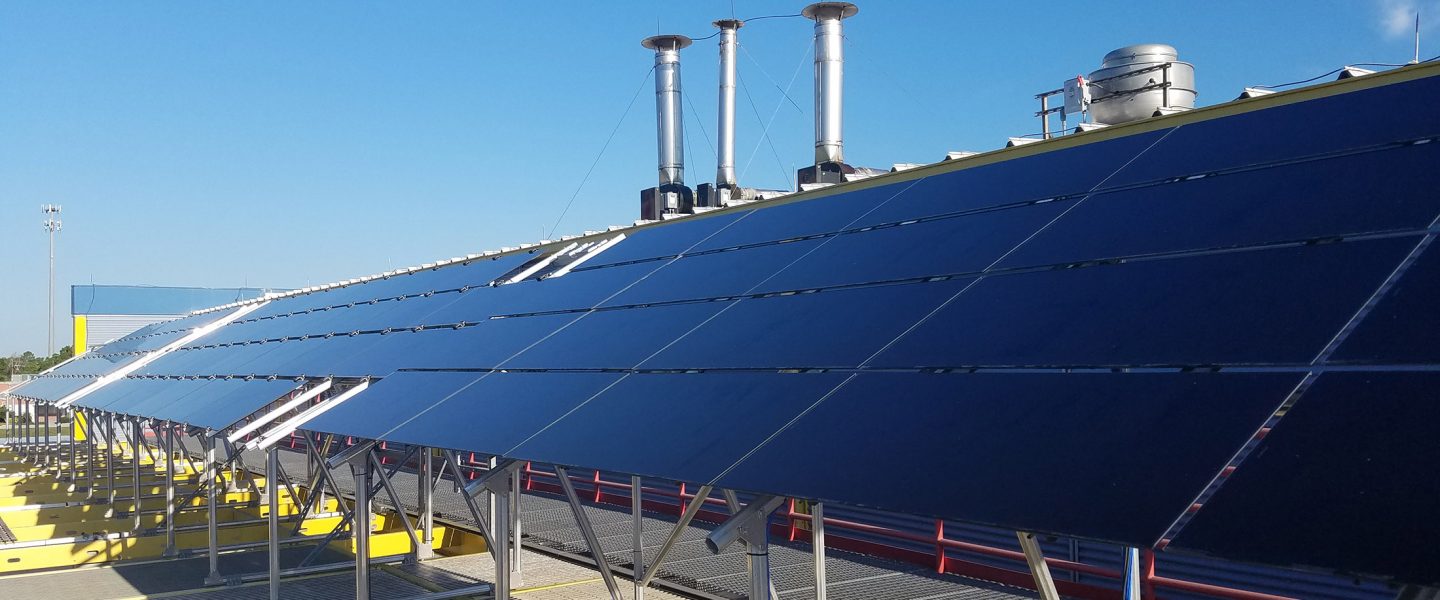
The FSEC Energy Research Center at UCF conducts a wide range of research in solar technology. From long-term reliability and durability testing to thin-film photovoltaic production techniques, the FSEC Energy Research Center is a leader in solar research, specializing in the hot and humid climate.
Photovoltaic Capabilities
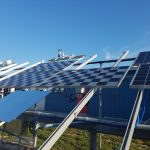 The photovoltaic capabilities at the FSEC Energy Research Center range from small-scale thin film photovoltaic (PV) cell manufacturing to large-scale commercial PV systems testing. Photovoltaic capabilities also include module durability, and on-site testing and field evaluation of solar lighting systems. Intructor-led, hands-on training, and photovoltaic technical support are also areas of expertise.
The photovoltaic capabilities at the FSEC Energy Research Center range from small-scale thin film photovoltaic (PV) cell manufacturing to large-scale commercial PV systems testing. Photovoltaic capabilities also include module durability, and on-site testing and field evaluation of solar lighting systems. Intructor-led, hands-on training, and photovoltaic technical support are also areas of expertise.
Learn More: Photovoltaic Capabilities
ADVANCED PV SYSTEM PERFORMANCE
Floating Solar Photovoltaic Systems
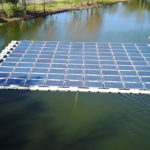 Floating photovoltaic (FPV) systems, also known as floating solar, are electricity-generating solar panels affixed atop buoyant platforms, sited directly on bodies of water. This research project will monitor the performance, durability, water-quality impacts and biodiversity interactions of four existing U.S. floating solar sites across diverse climatic regions. Learn More: Floating Solar
Floating photovoltaic (FPV) systems, also known as floating solar, are electricity-generating solar panels affixed atop buoyant platforms, sited directly on bodies of water. This research project will monitor the performance, durability, water-quality impacts and biodiversity interactions of four existing U.S. floating solar sites across diverse climatic regions. Learn More: Floating Solar
Photovoltaic Systems Monitoring
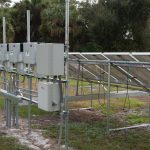 The reliability of a photovoltaic system is dependent upon all of its components. The PV modules, inverter, charge controller, meter, and switches must all work together. UCF researchers have extensive systems monitoring experience, ranging in size from small residential systems to large-scale commercial systems.
The reliability of a photovoltaic system is dependent upon all of its components. The PV modules, inverter, charge controller, meter, and switches must all work together. UCF researchers have extensive systems monitoring experience, ranging in size from small residential systems to large-scale commercial systems.
PHOTOVOLTAIC DURABILITY RESEARCH
Photovoltaic Degradation Analysis
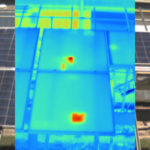 Photovoltaic modules degrade in a variety of ways when exposed to different environmental conditions. Researchers are investigating degradation processes that impact long-term module reliability and durability. Research areas include the development of accelerated aging protocols to screen for specific failure modes, development of novel module characterization techniques to detect and quantify degradation, and identifying new degradation pathways in emerging technologies. Module characterization reveals how the performance degrades and points researchers to analyze specific components of the packaging scheme (e.g., encapsulant, cell, interconnects). Cored samples of cells can be extracted from modules and characterized to probe potential causes for degradation at the material level. This provides insights that could be used to find areas of improvement through the process chain. Learn More: Photovoltic Degradation Analysis
Photovoltaic modules degrade in a variety of ways when exposed to different environmental conditions. Researchers are investigating degradation processes that impact long-term module reliability and durability. Research areas include the development of accelerated aging protocols to screen for specific failure modes, development of novel module characterization techniques to detect and quantify degradation, and identifying new degradation pathways in emerging technologies. Module characterization reveals how the performance degrades and points researchers to analyze specific components of the packaging scheme (e.g., encapsulant, cell, interconnects). Cored samples of cells can be extracted from modules and characterized to probe potential causes for degradation at the material level. This provides insights that could be used to find areas of improvement through the process chain. Learn More: Photovoltic Degradation Analysis
Photovoltaic Mechanical Durability Testing
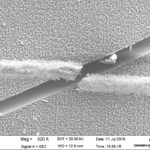 Mechanical durability is one of the most critical aspects of module reliability as modules commonly experience external mechanical loads from snow and wind once in the field. These mechanical loads can cause cells within the module to fracture, causing electrical discontinuities that reduce the module performance. With the use of a novel mechanical load tester for photovoltaic modules, researchers are currently exploring how different module designs influence mechanical durability. Each component of the module—including the solar cells, interconnects, module packaging and frame design—all have an unique impact on the overall susceptibility to cell cracking. Learn more about Modeling and Testing of Advanced Module Design.
Mechanical durability is one of the most critical aspects of module reliability as modules commonly experience external mechanical loads from snow and wind once in the field. These mechanical loads can cause cells within the module to fracture, causing electrical discontinuities that reduce the module performance. With the use of a novel mechanical load tester for photovoltaic modules, researchers are currently exploring how different module designs influence mechanical durability. Each component of the module—including the solar cells, interconnects, module packaging and frame design—all have an unique impact on the overall susceptibility to cell cracking. Learn more about Modeling and Testing of Advanced Module Design.
In addition to evaluating module designs, there is also research focused on improving the qualification testing protocol for mechanical durability. With the use of real-world field data, researchers are working to make accelerated testing protocols that better replicate mechanical loads and environmental conditions that are observed in the field.
Suggested Publications:
- Evaluating Solar Cell Fracture as a Function of Module Mechanical Loading Conditions
- Cyclic Mechanical Loading of Solar Panels – A Field Experiment
PHOTOVOLTAIC TECHNOLOGY DEVELOPMENT
Wafering Technology

Improving photovoltaic manufacturing materials and processes lead to decreased manufacturing costs. UCF researchers are evaluating the diamond wire that is used to slice monocrystalline silicon ingot into wafers, advanced module design. Projects include:
- Diamond Wire Failure Modes and Wear Mechanisms
- Inline Metrology for Diamond Wire Monitoring
- Diamond Wire Cut Wafers – Inline Optical Characterization
- Diamond Wire Sawing for PV—Short- and Long-term Challenges (paper)
Photovoltaic Module Interconnection
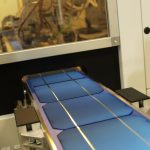
Photovoltaic manufacturing companies have developed innovative methods of connecting cells together to improve performance and reliability. UCF researchers are evaluating novel interconnection technologies, such as SmartWire and shingled cells, to provide information that will help catalyze industry adoption of higher performing modules. Since interconnection failures contribute to module failures experienced in the field, it is important to improve existing schemes and validate the reliability of emerging technologies.
SOLAR THERMAL RESEARCH
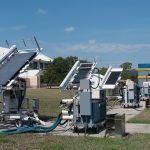
Solar thermal research is one of FSEC’s flagship programs, and includes both solar water heating and solar cooking. Although there are no current research projects on solar thermal, FSEC has a long history of testing and research on this topic that ranges from commercial systems to solar weatherization programs to low-cost solar ovens for third-world countries.
Solar Weatherization Assistance Program
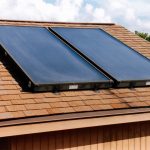 Raising families, incurring everyday bills and purchasing common necessities are all part of daily life that can rapidly drain a family’s budget. This is especially burdensome for low-income and elderly residents on a fixed or service economy income. A major part of the budgetary concerns are the unavoidable electric bills. This is a major concern for low-income residents. Studies have shown that 11 percent of a low-income residents’ yearly income goes toward paying energy bills (note that for mid-income residents, only 3 percent of the yearly income goes toward paying energy bills). Taking advantage of Florida’s abundant and renewable solar energy resource helps reduce energy costs in low-income residences. “A solar water system doesn’t just help with the energy bill, it also relieves other financial stress,” said Brenda Mobley, SWAP program manager for the Mid Florida Community Services Agency.
Raising families, incurring everyday bills and purchasing common necessities are all part of daily life that can rapidly drain a family’s budget. This is especially burdensome for low-income and elderly residents on a fixed or service economy income. A major part of the budgetary concerns are the unavoidable electric bills. This is a major concern for low-income residents. Studies have shown that 11 percent of a low-income residents’ yearly income goes toward paying energy bills (note that for mid-income residents, only 3 percent of the yearly income goes toward paying energy bills). Taking advantage of Florida’s abundant and renewable solar energy resource helps reduce energy costs in low-income residences. “A solar water system doesn’t just help with the energy bill, it also relieves other financial stress,” said Brenda Mobley, SWAP program manager for the Mid Florida Community Services Agency.
Years of Research: 1994-1997, 2002-2004
Sponsored by: Florida Department of Community Affairs
Suggested Publication:
Solar Cooker Development and Testing
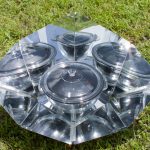 In developing nations, some cannot gather fuel or afford to buy it to cook their food or purify their water. Low-cost solar cookers is a solution. This research project hoped to improve the performance, reliability and cost-effectiveness of low-cost solar cookers for use in developing nations.
In developing nations, some cannot gather fuel or afford to buy it to cook their food or purify their water. Low-cost solar cookers is a solution. This research project hoped to improve the performance, reliability and cost-effectiveness of low-cost solar cookers for use in developing nations.
Learn More: Solar Cooker Development and Testing
[Last updated 08/31/2021]